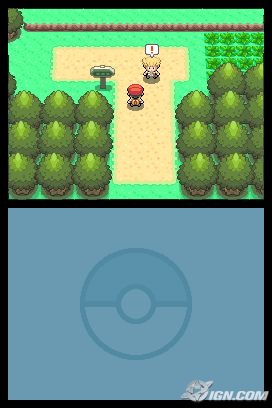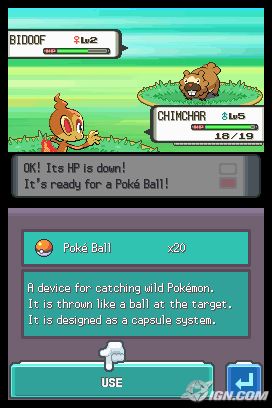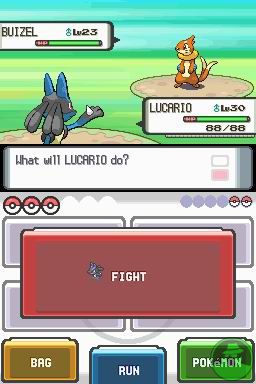POKEMON DIAMON/PEARL
Much to the delight of Pokémaniacs the world over, Nintendo and Game Freak have finally brought a proper Pokémon game to the Nintendo DS with Pokémon Diamond and Pearl, and it delivers much of what a fan would desire—a richer, more detailed presentation, the ability to battle and trade Pokémon over the Internet, and of course, more than 100 brand-new Pokémon to collect. Like any of the core Pokémon games released since the original Red and Blue hit in 1999, Diamond and Pearl offer some nice upgrades, but if you didn't like Pokémon then, you probably won't care for it now. That said, it's a little surprising how well the formula holds up in Diamond and Pearl, which is a testament to the strong fundamentals of the series as well as the quality of the execution.
Sticking to the script, Diamond and Pearl start out the same as any other Pokémon game, and though the specifics are different, the story plays out in a familiar fashion. Playing as either a young boy or girl living in the out-of-the-way hamlet of Twinleaf Town in the Sinnoh region, you and your highly competitive best friend are sent into the world by Professor Rowan to collect as much data on the Pokémon that inhabit the region as is possible, which you do by capturing and fighting. During your travels, you will battle plenty of wild Pokémon and other Pokémon trainers like yourself, as well as face off with the leaders of eight different Pokémon gyms spread across Sinnoh. And, in the tradition of the nefarious Team Rocket, Diamond and Pearl introduce the shadowy and oddly self-righteous Team Galactic, a new Pokémon-obsessed organization for you to square off with. The plot doesn't tread much new ground for the series, and it generally keeps things real light and breezy. They won't dazzle you with the complexity or originality of their storytelling, but Diamond and Pearl are still packed with lots of sharp writing. There are hundreds of people for you to meet, and though they don't always offer lengthy conversations, they all have something to say.
The story is ultimately in the service of the gameplay, which fans and newcomers should be able to leap right into without much fuss. You start off with a single Pokémon companion by your side, which serves as your proxy in battle—you might be calling the shots in a fight, but it's your Pokémon that do all the heavy lifting. As you wander through forests, fields of tall grass, underground caves, and a myriad of other locations, you'll regularly be attacked by wild Pokémon, which, if you're able to wear down their health without defeating them entirely, can be captured in a Pokéball, effectively taming them and turning them into companions. You can have up to six Pokémon with you at once, and each of your Pokémon can learn up to four different abilities. These abilities can come naturally as they earn experience in battle, or you can teach them new tricks using technical machines and hidden machines, which can be earned in a number of different ways. As they grow stronger, many Pokémon can also evolve, effectively turning them into an entirely new and more powerful Pokémon.
The combat is turn based, and it's mostly about the rock-paper-scissors nature of the different types of Pokémon. The only difference between Diamond and Pearl is the Pokémon contained within each game. With the addition of 107 brand-new Pokémon, Diamond and Pearl raise the grand total of Pokémon to capture to well over 480. Every single one of them can be categorized by type. Some of these types are defined by elements, such as water-type Pokémon and fire-type Pokémon, while others are determined by more specific, functional differences, such as fight-type Pokémon and poison-type Pokémon. Each type of Pokémon is inherently weak to the attacks of another, so the key to combat is having a well-balanced team of Pokémon with you that will be able to handle whatever types of Pokémon get thrown at you. It's a simple enough concept to grasp, but there are enough different types of Pokémon out there that you'll find yourself constantly tweaking your roster of active Pokémon and laboring over which abilities you should be giving to which of your Pokémon. The fact that you're constantly running in to, and thus capturing, new Pokémon makes the process that much more involved. And that's just the basics. Aside from wandering around the Sinnoh region and getting into countless Pokémon battles, you'll fish, harvest and plant berries, cook up special treats for your Pokémon, enter your Pokémon in a pageant, set up a secret hideout, and more. These games are long, with the main stories clocking in at well over 40 hours, and those intent on hunting down the rarer Pokémon will spend far more than that.
The bulk of the activities in Pokémon Diamond and Pearl aren't new to the series, so what separates these two from the Pokémon games that appeared on the Game Boy Advance? For starters, the presentation has been improved to take advantage of the superior DS hardware. Though the game is mostly still presented in 2D, there's improved detail to the 2D and you'll notice lots of nice polygonal touches. For example, buildings and windmills are rendered in 3D, and it's enough to give the 2D world a little depth. The game also has a bright, highly saturated color palette that makes it a pleasure to look at. When in battle, the Pokémon are still static 2D sprites—much of which appears to have been recycled from the Pokémon games on the GBA—but in general, the 2D art still looks sharp. The dynamic battle transitions look great, as do the numerous attack effects. Diamond and Pearl also feature some catchy music, and there's a whole lot of it, with a special theme for virtually every location or activity. As clean and upbeat as the music is, though, some of the sound effects from the Pokémon themselves sound screechy and lo-fi. It's out of place, considering how great the rest of the game looks and sounds.
There's also a little touch-screen support in Diamond and Pearl, letting you use the stylus to select menus during battle and play a few simple, rather forgettable minigames that crop up. During most of your travels, the lower screen on the DS is occupied by your Pokémon watch (Pokétch for short). In addition to telling the time, you can install a number of applications, some more useful than others, on your Pokétch. There's a calculator, a pedometer, a status screen for your Pokémon, a metal detector of sorts, and more.
What's probably the most significant new feature in Diamond and Pearl is online play, which lets you battle, trade, and chat with other players over the Internet. The trading system is surprisingly robust, letting you put any of your Pokémon up for trade on a global market, while specifying which Pokémon you'll trade it for. Once you define the terms of the trade, the Pokémon is transferred to a server, and you can set it and forget it. Your DS doesn't even need to be turned on for someone to agree to your terms and complete the transaction. The online battle options aren't as immediately accessible. Early on, you'll need the game-specific friend code for anyone that you want to battle online, and it will take dozens of hours of single-player action before you'll be able to battle with random strangers. The game also supports voice chat using the newly released DS headset, but you can only use it with other players whose friend codes you've already registered. Of course, you can also still battle and trade with other people through a local Wi-Fi connection. Diamond and Pearl also promise connectivity to the upcoming Pokémon Battle Revolution for the Nintendo Wii, purportedly letting you use your DS as a controller and take the Pokémon you've collected on the DS into battle on your TV.
Between the 100-plus new Pokémon, the improved presentation, and the online play, this is a must-have game for established fans. The new features also make this the most well-rounded Pokémon game to date, and if you've never dabbled in the world of Pokémon before, there's no better game to start with.
















No comments:
Post a Comment